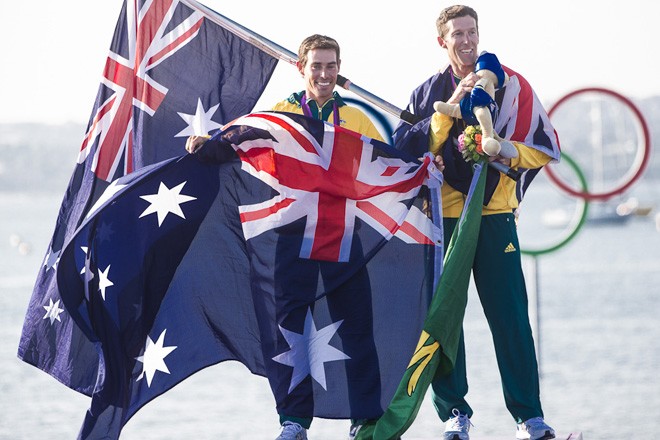Leveraging London - how to turn sailing gold into participation
by Jeni Bone on 14 Aug 2012

London 2012 - Olympic Games . Day 13 Medal race 4.70 Men’s - Mathew Belcher and Malcolm Page Carlo Borlenghi/FIV - copyright
Sailing has taken the dais as Australia’s most successful sport at the 2012 London Olympic Games and should reap a substantial funding boost as a result. But is there a flow on effect for participation?
Despite the national broadcaster, Nine, snubbing sailing by not broadcasting the final minutes of the gold-medal winning race, sailing enjoyed huge popularity with spectators in Weymouth and viewers all over the globe were treated to some of the best conditions and competitive action on water of any Olympic Games.
The Twittersphere went in to meltdown when sailing fans learnt of Nine’s decision to switch away from Malcolm Page and Mathew Belcher’s gold-medal winning race in the closing stages of the event, and instead show a replay of the finish.
Page and Belcher’s win was Australia's seventh overall gold at these Games, and made Australia the most successful sailing team in the world.
Sailing coach, Victor Kovalenko was quick to make his views public and said the sailors wanted to share their success with Australia.
'It is not acceptable when they stop the program 30 seconds before Olympic champions finished their race,' he said.
Kovalenko said Australian sailing’s number one goal was 'to make more recognition for our sport in Australia'
In his unique manner, he said: 'We would like to make our sport visible because this is [a] sport for Australia — sailors, seamanship, fisherman, even farmers [are] involved in our sport.
'We are very proud to bring our gold to show the Australian public [that]: 'Guys, your money is spent in right directions, each dollar is spent in the right direction, and we are very proud to prove to all the world that Australia is not just territory'. This is strong country. This is big head and hot heart.'
These are both worthy aims, but according to the experts, will take marketing and media nous, and a unified approach to show the public the sport is accessible.
Neer Korn, social researcher and found of the Korn Group, said 'It really depends on luck, talent and PR'.
'Luck – as in whether this is one of the few medal winners and therefore they receive much publicity and the story is told often. Talent – the individual competitors and whether they are articulate, photogenic and have a good story to tell and able to sell it. And PR – really how their exposure is managed, the frequency of their media appearances and involvement in events as ambassadors of the sport.'
It is too early to say whether or not sailing can reap the benefits in terms of increased participation, sponsorship and interest in mainstream hearts and minds.
'It’s unpredictable as yet,' said Korn. 'As a sport it’s one of the harder ones to sell to those outside that community, but it has the attributes to gain traction. The America’s Cup is a good example of PR gone wild. It’s an event that does not capture the imagination of the majority of Australians unless the circumstances are extraordinary as it was in that particular race. Throw in Ben Lexcen as a great spokesperson with an interesting story and the good-sport rivalry between USA and Oz in a race Australia had been a long standing underdog.'
Chris Styring, General Manager at Sweeney Sports & Entertainment, said the unparalleled sailing success was 'the shot in the arm the country needed'.
'It was just what we needed in order to maintain a positive outlook from the London 2012 Games in the second week of competition, given earlier disappointments from some of the more high profile sports,' he explained.
'This medal haul will hopefully lead to an increase in interest and participation levels for sailing across both genders and all ages.
'Our sailing Olympians have demonstrated that we can be the best in the world. As we know success breeds success so the governing bodies and authorities have a rare opportunity to capitalise on these world beating results and engage with the general population.
'With this in mind the communications strategy and approach will be vitally important if we wish to encourage greater participation and continue this success on the water in Rio.
'In the last two quarters we have seen increases in interest, participation and TV viewing for sailing and we would expect this trend to continue for the current quarter off the back of a wonderful London campaign. The opportunity is certainly there, it will just come down to how we execute.'
In the next instalment of this feature, we will have exclusive comment from Phil Jones, CEO of Yachting Australia about the way forward for the sport and how the organisation will convert happiness and hype in to grass roots appeal.
If you want to link to this article then please use this URL: www.sail-world.com/100936